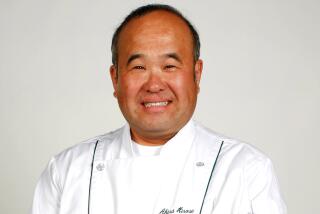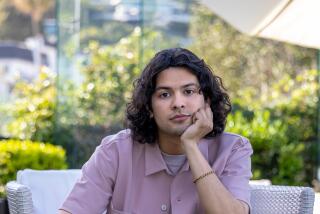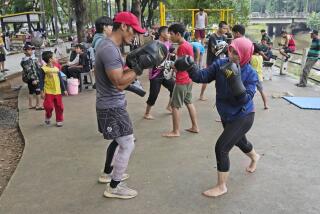Nishiyama’s Calling Goes Beyond Olympic Dreams
Hidetaka Nishiyama took his first karate class when he was a 17-year-old college student in Tokyo. The son of a lawyer and a member of a family that had lived in Japan’s signature city for 300 years, Nishiyama expected to have a life filled with academic pursuits and business successes.
He is 72 now and Nishiyama entertains visitors on a Friday afternoon not in some monstrous Tokyo office tower but in a small storefront dojo on Olympic Boulevard. A dojo is a place to learn karate. Nishiyama is described as “one of the great souls of our city,” by one of his pupils, Michael Elias.
This dojo, in a neighborhood cluttered with abandoned stores and decorated by graffiti, is a spartan space. There are no trophies on display or gaudy tributes to Sensei Nishiyama, which is the respectful way his students refer to their teacher. On the white wall are two crossed flags, of the United States and Japan, and a drawing of Gichin Funakoshi, who was Nishiyama’s sensei years ago. In the back, Nishiyama has a tiny office filled with books and unpacked boxes. The boxes have been here for seven years but interior decorating is not of great importance to him.
Only karate is.
For most of his life now, since that moment when he first listened to Sensei Funakoshi speak reverently of the mystical places inside the mind where karate lessons could take him as well as the physical strength that could be built, Nishiyama has been on a quixotic quest to have karate included in the Olympics.
After Nishiyama watched his country lose World War II and he aided in the rebuilding of Japan, he brought his family--a wife and three daughters--to Los Angeles in 1961 so that he could teach his sport. Nishiyama believed that being honest and staying true to the ancient tenets of karate eventually would be good enough to convince the International Olympic Committee that just as judo and taekwondo became Olympic sports, so should karate.
This battle has been useless so far. Nishiyama, who is president of the International Traditional Karate Federation and of the American Amateur Karate Federation, has found out what so many others have--that politics and money are what make the IOC work.
There is a competing organization, the World Karate Federation. Nishiyama believes that the WKF is too willing to bend the sport to fit the IOC, too willing to change rules so that karate might become more telegenic or marketable. In karate you do not wear shoes or warmups. There goes the Nike contract. The only color is the belt. Black is the best. Hard to jazz that up. Nishiyama says he has discovered that IOC President Juan Antonio Samaranch “is capable of lying to me.” He has watched as officials of the WKF are now headquartered in that karate hotbed of Spain, which is, coincidentally, the home of Samaranch.
So after spending all these decades pushing, prodding, caressing, coddling, whatever he thought it would take, Nishiyama now sits back in his chair and says that “I don’t know anymore if I want my art in the Olympics.”
Nishiyama shakes his head sadly when he thinks about some of the new Olympic sports. “Beach volleyball,” he says and uses his hands to illustrate what he thinks makes beach volleyball so Olympic-ready. “Bathing suits,” he says. “Skin cancer,” he says in disgust.
The smile returns to Nishiyama’s face when he talks about his dojo. It fills up on Saturdays and Sundays with the kids from the neighborhood who come to learn from this master. For almost 30 years it has filled up with kids from the neighborhood. Those kids used to be mostly Koreans and Japanese. Now they are Latinos.
Avi Rokah moved from Israel to Los Angeles when he was 21 to learn karate from Nishiyama. “I started taking karate when I was 15,” he says, “and always, always, the talk was about Sensei Nishiyama. As soon as I got out of the Israeli Army I came here to learn from Sensei Nishiyama. I am 39 years old now and I am still learning. Nobody has the knowledge Sensei Nishiyama has.”
An international champion, Rokah has opened his own dojo in Beverly Hills. That Nishiyama has never left the corner of Olympic and Valencia, that Nishiyama welcomes the neighborhood children no matter what language they speak, this fills Rokah with admiration.
“I think this is great,” he says. “I believe that karate can really change somebody’s life. To me, karate is as important as school can be in teaching things like discipline and social skills. You can learn also from karate the ability to focus. For those children in Sensei Nishiyama’s neighborhood, that’s very special.”
It is not only children Nishiyama teaches, though. People such as Elias, who is a screenwriter, and Rokah still take classes. They marvel at the transformation that Nishiyama makes each evening at class.
This 72-year-old man, who is only 5 feet 6, weighs 155 pounds and seems meek on a Friday afternoon turns into a man of imposing strength and controlled fury.
“He screams,” Elias says.
“He is like Superman,” Rokah says. “He makes a transformation so big that all of a sudden Sensei Nishiyama becomes 20 years younger.”
*
Diane Pucin can be reached at her e-mail address: [email protected].
More to Read
Go beyond the scoreboard
Get the latest on L.A.'s teams in the daily Sports Report newsletter.
You may occasionally receive promotional content from the Los Angeles Times.






